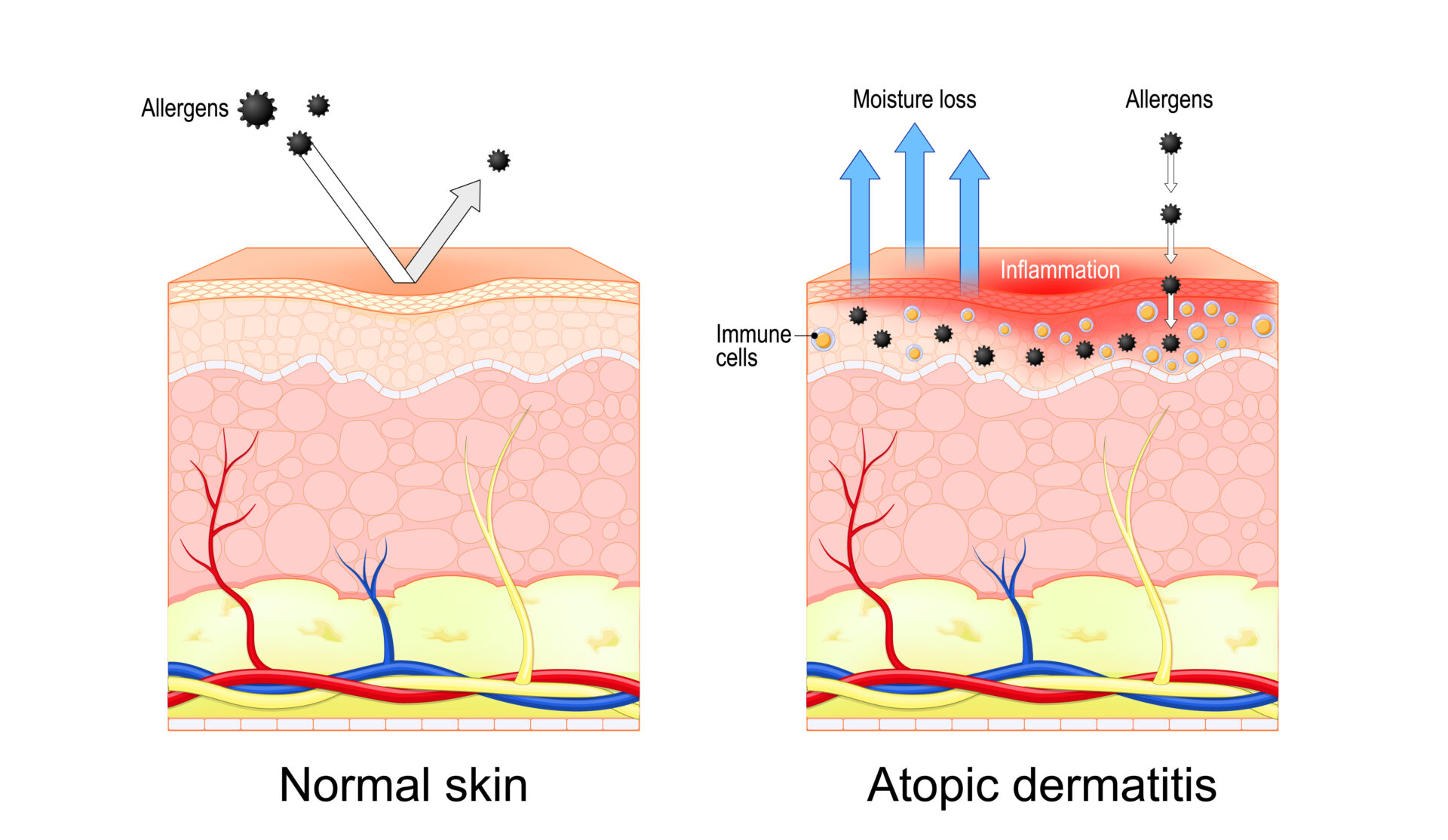Eczema is not contagious, as it’s caused by an overactive immune system. Eczema manifests in two main forms: allergy-induced eczema—triggered by allergens like pet dander, perfumes, and certain foods—and atopic dermatitis—triggered by environmental factors like weather changes, stress, and dry air.
The primary causes of eczema are related to genetics and environmental factors. Genetic mutations in certain genes (FLG, KIF3A, CARD11) can weaken the skin barrier, making individuals more susceptible. Additionally, environmental factors, such as exposure to pollution, allergens, and poor diet, can also contribute to its development.
While eczema cannot be spread from person to person, understanding its triggers and underlying causes can help manage and prevent flare-ups.
What Is Eczema?
So, if eczema is not contagious, then what is it? Eczema is a condition where a hypersensitive immune system overreacts to a substance or environmental factor and triggers the body to release too much histamine, causing temporary but painful and irritating changes to the skin.
Eczema patients suffer from either allergy-induced eczema, where a particular allergen causes the skin to flare up, or atopic dermatitis, where environmental factors play a role in the flare-up.

Causes of Allery-Induced Eczema
A variety of allergens can cause eczema patients to develop skin irritation, including:
- Glues and adhesives
- Chemical substances
- Clothing or hair dyes
- Creams, lotions, and oils
- Dust mites
- Foods, particularly eggs, citrus fruits, spices, or soy
- Latex
- Metals, particularly nickel
- Perfumes
- Pet dander
- Poison ivy or oak
- Soaps and detergents
Causes of Atopic Dermatitis
Sometimes, it’s not an allergen that will trigger a flare-up for an eczema patient but an environmental change, like:
- Changes in the weather, such as the switch from a cold winter to a warm spring or a warm autumn to a cold winter
- Stress
- Smoky or smoggy environments
- Dry air
- Excessive sweat on the skin
- Prolonged exposure to heat or hot water
If Eczema Isn’t Contagious, Why Do People Have It?
Since eczema is not something that can be caught or spread, where does it come from?
The short answer is genetics and environmental factors.
Eczema and Genetics
Both allergy-induced eczema and atopic dermatitis have a hereditary or genetic component to them, meaning the genes involved in the development of eczema are passed down from family member to family member.
In fact, if someone with eczema or other allergy-based issues—like asthma or hay fever—has a child, the child is 50-70% likely to develop eczema, asthma, and/or hay fever. If both parents suffer, the child’s risk increases to 80%.
There are several genes involved in the development of eczema, including, but not limited to:
- FLG – the filaggrin (FLG) gene plays a role in the strength or weakness of the skin’s barrier. FLG mutations can cause the skin’s barrier to be more susceptible to becoming dry, flaky, or itchy.
- KIF3A – the KIF3A gene codes for a particular protein that sends signals from outside a cell to the inside of a cell. A mutation to this gene often interferes with these signals, disrupting communication and leading to weakened skin barriers.
- CARD11 – the CARD11 gene plays a part in forming proteins that help the immune system fight off foreign bodies. A mutation to this gene can lead to immune system disorders that cause the skin barriers to weaken.
Eczema and Environmental Factors
In recent decades, researchers have noticed a rise in eczema cases, particularly atopic dermatitis. The rise in cases suggests that genetic mutations cannot be the only contributing factor, leading researchers to consider how environmental factors also play a role in its development.
Some recent findings suggest that:
- Too much exposure to soaps or scrubbing actions can weaken the strength and quality of the skin’s barriers.
- Too much exposure to low-quality indoor air, such as air polluted with tobacco smoke, can alter the strength or quality of the skin’s barrier.
- Too much exposure to airborne allergens like dust mites or pet dander can affect the immune system and the skin’s barrier.
- Too much exposure to urban environments with increased air pollution can affect the immune system and the strength of the skin.
- Low-quality diets or diets with minimal diversity in nutrients, especially in childhood, can affect the strength of the immune system and the skin.
- Too much exposure to germs and viruses, especially in childhood, can impact the strength of the immune system and the skin’s barrier.
If you have started to develop eczema in adulthood or have suffered from eczema since childhood, turn to the eczema specialists at Langford Allergy for optimal care and relief.
Dr. Langford, Dr. Mathew, and our team of allergy specialists offer specialized care and treatment to all eczema and skin allergy patients. We create individualized and effective treatment and management plans that relieve the itch and clear your skin.
Schedule an eczema appointment today: 478-787-4728
Langford Allergy delivers allergy, asthma, and immunodeficiency care to patients throughout Middle Georgia, including:
- Bonaire, GA
- Byron, GA
- Forsyth, GA
- Fort Valley, GA
- Gray, GA
- Macon, GA
- Milledgeville, GA
- Perry, GA
- Warner Robins, GA
And other surrounding areas.
Recent articles:
